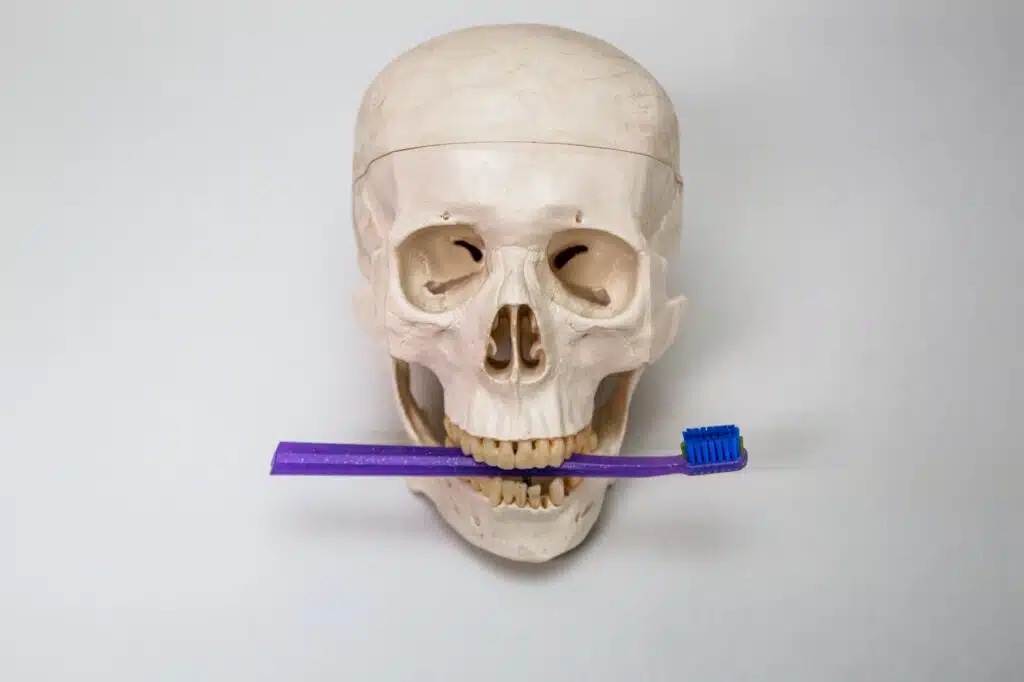If you place your finger in the area in front of your ear and open your mouth, you can feel the movement of the temporomandibular joint (TMJ). If you make various jaw movements, you can quickly notice this joint is different from simple hinge joints like you have in your fingers. We benefit from the complex anatomy of the TMJ because it allows the various jaw movements necessary for speech, eating, drinking, and breathing. However, disorders of this joint can cause problems that affect the quality of your life. Continue reading to learn more about the temporomandibular joint dysfunction and how you can practice effective self-care when problems arise.
If you have any questions or concerns about jaw dysfunction or pain, schedule an appointment with Trident Dental for a comprehensive oral exam and TMJ evaluation.
What Is TMJ Dysfunction?
TMJ dysfunction is a disorder caused by one or more factors that affect the bone, muscles, nerves, ligaments, and tendons around one or both of your temporomandibular joints. These are the two complex joints that attach your mandible, or lower jaw, to your skull. The impaired function of the TMJ can lead to a variety of problems that may require professional treatment.
What Causes TMJ Dysfunction?
The causes of TMJ dysfunction include:
-
Clenching or grinding your teeth.
-
Teeth not biting together correctly.
-
Dislocation of the joint components.
-
Some types of rheumatoid and osteoarthritis.
-
Physical or psychological stress.
-
Genetics.
-
Head or facial trauma.
-
Certain connective tissue disorders.
What Are The Symptoms Of TMJ Dysfunction?
The symptoms associated with TMJ dysfunction can range from mild discomfort to severe and debilitating pain. Symptoms may occur intermittently for short periods or persist for years on one or both sides of the face. TMJ disorders affect more than one in ten adults, with most cases seen between twenty to forty years. Men and women can experience the symptoms, but it is more frequently seen in women. The range of symptoms include:
-
Pain in the area around your ear, especially when you chew or open your mouth wide, such as yawning or talking.
-
Jaw sounds when you open or close your mouth. The sounds vary between clicking or popping. Some people report a grating sound when moving their jaw.
-
Tired facial muscles.
-
Difficulties with your mouth getting stuck open or closed.
-
A feeling that upper and lower teeth don’t fit together correctly.
-
Facial swelling on one side.
-
Headaches.
-
Pain or tightness in the neck and shoulders.
-
Toothaches.
-
Worn, cracked, or broken teeth.
-
Difficulty sleeping.
Professional Treatment For TMJ Dysfunction
Your oral health care provider has several treatment options depending on the cause and severity of your symptoms. These treatments include:
-
Custom-made night guard.
-
Replacing defective dental restorations.
-
Orthodontic straightening of crooked teeth.
-
Selective grinding on dental enamel to improve the way that teeth fit together.
-
Surgery on the temporomandibular joint.
-
Analgesics or muscle relaxers.
Self-Care Tips For TMJ Dysfunction
Although you may eventually need professional treatment, there are many things you can do to help improve TMJ symptoms, such as:
-
Moist heat applications. Applying moist heat for twenty minutes several times each day can relax muscles and reduce joint and muscle pain.
-
Cold compresses. Some people find added benefits to alternating heat and ice for enhanced blood flow to the painful jaw muscles.
-
Eating soft foods. Avoiding hard and crunchy foods and consuming softer foods such as yogurt, eggs, beans, and grains can give your jaw muscles and the temporomandibular joint time to relax and heal.
-
Over-the-counter analgesics. Anti-inflammatory medications such as aspirin and ibuprofen can help inflammation in jaw muscles resolve faster.
-
Avoiding certain jaw movements. Yawning, chewing gum, and habitually biting on nonfood items can keep the TMJ inflamed and painful.
Schedule Appointment
Contact us at Trident Dental to learn how we can help you with any questions or problems you might experience with tooth, face, or jaw pain. We also provide regular dental checkups and professional teeth cleanings that help you maintain healthy teeth and gums and have a smile you have always wanted.

